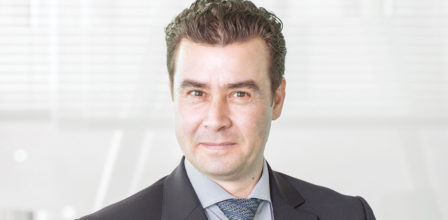Quoniam Research Seminars: Bridging the gap between theory and practice
Academic research is plentiful, but do theories work in real portfolios? Quoniam’s research team has launched a new seminar series to increase the exchange between financial researchers and quant practitioners. Halfway through the series, Dr Tamas Barko, organiser of the series, reflects on the lessons learned from the first sessions and the benefits of engaging with universities for research-driven asset managers.

What were your intentions when you created the concept of the Quoniam Research Seminars (QRS)?
At Quoniam, our research focus is on identifying scientific or research-based performance drivers and applying them to real-world portfolios. We are not single stock pickers, but use data to assess, for example, the profitability of a company or the fair value of a stock or bond. Our data-driven assessments are aggregated to construct broadly diversified portfolios. This approach is known as systematic or quantitative investing.
While value and quality have been well-known performance drivers for decades, as science-based researchers we are on the lookout for new sources of return. For example, capturing the value of a company’s patent portfolio is one aspect of the quality factor. Some sources of return cannot be captured in ratios as with more traditional factors such as the return on equity. For example, news sentiment analysis relies on machine learning techniques . It is important for us to stay ahead of the curve and learn about new findings before they are published in academic journals. The scientific publication process can take a long time, so being aware of the latest developments in academic research can be a competitive advantage.
How do you choose the topics?
We invite speakers who have a research agenda relevant to our own interests, but we do not choose the exact topics. The actual content of the presentation is the sole decision of the invited speaker. Creating a shortlist for potential speakers is a team effort. We simply keep our eyes open at the various events we attend. For example, I will be attending the European Finance Association conference again this year, which is the largest European finance research conference – so there will be a lot of potential to get in touch with interesting new speakers.
-
Florian Weigert – Université de Neuchâtelpredict mutual fund performance with machine learning
Florian Weigert of the Université de Neuchâtel explained how you can predict mutual fund performance with machine learning. Together with his research colleagues he found that one can reliably predict not only the top US mutual funds, but the underperforming ones as well, and that the predictors include fund characteristics as well as past performance metrics.
-
Ran Xing – Stockholm University and the Swedish House of Financefund managers’ career concerns and investment horizons
Ran Xing from Stockholm University and the Swedish House of Finance presented his research on fund managers’ career concerns and investment horizons. He formulated a model showing that new mutual fund managers prefer short-term, high-turnover investments, since this type of investment speeds up the process of learning about their own skill and signaling that skill to investors. Conversely, successful, skilled managers tend to manage larger funds with lower turnover later in their careers.
-
Esad Smajlbegovic – Erasmus University Rotterdamrelationship between short selling and stock returns
Esad Smajlbegovic from Erasmus University Rotterdam gave an on-site seminar on his research about the relationship between short selling and stock returns. The proposed new measure, the ‘surprise’ in short interest, reflects changes in short sellers’ positions, but also appears to be a significant predictor of future stock returns and company fundamentals. The researchers argue that the results show that on the one hand, short sellers are indeed informed traders. On the other hand, there is a significant anchoring effect with respect to how the average investor underreacts because of focusing on the past ‘levels’ of short interest.
-
Markus Ibert – Copenhagen Business Schoolasset managers’ return expectations differ significantly from those of private investors
We had the pleasure of welcoming Markus Ibert from Copenhagen Business School to our Frankfurt office. Markus explained why, according to his research, asset managers’ return expectations differ significantly from those of private investors. Professionals’ return forecasts are countercyclical, i.e. high when valuations are low. The asset managers surveyed in the paper allocate capital in line with these forecasts.
-
Glen Gostlow – The London School of Economics and Political Science (LSE) and the University of Zurichpricing physical climate risk
Glen Gostlow, who is affiliated with the The London School of Economics and Political Science (LSE) and the University of Zurich, gave an online presentation about his research on the difficulties of pricing physical climate risk. His analysis shows that different extreme weather events command varying degrees of risk premium. While hurricane risk has a positive risk premium, it is negative for heat stress, while rainfall and sea level rise command no risk premium. Overall, the priced portion of climate risk appears to be low, ranging between 8% and 38% as a fraction of its total variation.
What impact did the sessions have on you and the whole Quoniam team?
The seminars allowed us to benefit from lively discussions between academic researchers and our research forecasts and portfolio management teams. As always, constructive challenge helps us to improve and gain new perspectives on our work. For example, one discussion went into the intricate details about the treatment of statistical outliers and surprises. Our usual approach was different from the one described by the speaker, yet it was inspiring to see how we were able to reconcile all the facets of the problem in the end. On the other hand, some parts of the sessions also confirmed our existing concepts, the factor definitions we use or the research ideas we have, which was a great boost to our confidence in what we are doing as a team.
What did you find most inspiring?
For me, it was very inspiring to see how closely our day-to-day work aligns with the research interests of top academics . It is sometimes difficult to immediately see how academic research lines up with what we do as quantitative asset managers because the measures of success are quite different. However, during the QRS events I learned that academics and our team approach problems in a similar way: the underlying economic reasoning, the model development and the eventual data analytics are nearly identical, whether for an academic paper or for our next product. Our scientific and professional rigour compares well with the work of academics at top universities.
Some of the papers presented at the research seminars deal with qualitative or behavioural topics, such as the career concerns of fund managers. How is this relevant to Quoniam as a systematic manager?
We are always keen to challenge our own biases as “quants” and to understand the competitive landscape. Insights into how the industry works give us the opportunity to reflect on our own position. For example, one of the papers compared asset managers and retail investors and found that asset managers are much more rational and less emotionally driven, which was an endorsement of all professional asset managers.
It is also interesting for us to learn about new insights in behavioural finance, as we incorporate aspects of it into some of our research and investment approaches. An example is our multi-asset strategy that uses unstructured data to capture news sentiment.
What are the benefits for the speaker of attending the research seminars?
QRS is a genuine exchange of ideas. During the discussions, we give feedback on the presentations from a practitioner’s perspective. For example, we often discuss the feasibility or cost implications of the academic approach. Our expertise and feedback are relevant inputs to the discussion section of the research papers presented.
Of course, there is also the networking aspect – it always helps to expand one’s contacts, for example when practitioners are needed for an academic research project for the future; or when we, as practitioners, seek academic advice when challenging an investment model change.
It also helps our guest speakers that we share the content on LinkedIn during the QRS, as this increases the visibility of the academic work.
Can you give us an outlook for the upcoming autumn sessions?
We have three sessions confirmed so far. In early September we will have an online session with Wei Wu from Texas A&M University. On 26 September, Michael Weber from the University of Chicago Booth School of Business will visit our offices in Frankfurt . In mid-October, Chelsea Yao from Lancaster University will also hold a session in our offices. There may be other sessions to be confirmed.
Thanks for the interesting insights, Tamas!


